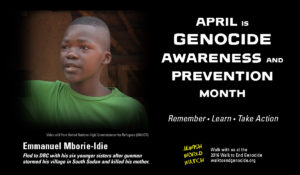In 2005, the Comprehensive Peace Agreement (CPA) ended Sudan’s decades-long civil war and provided the southerners an option to vote to secede from Sudan. On July 9, 2011, South Sudan became an independent country with the support of the United States.
Two years after independence growing tensions within the ruling Sudan People’s Liberation Movement (SPLM) culminated with President Kiir dismissing his entire cabinet in July 2013. In December 2013, civil war broke out as President Salva Kiir, an ethnic Dinka, accused former Vice President Riek Machar, an ethnic Nuer, of an attempted coup. Targeted attacks against Nuer men immediately followed and the once political conflict quickly became ethnically charged, as tensions between the two major ethnic groups in South Sudan grew.
Both government and opposition forces are responsible for committing war crimes and crimes against humanity—raping, killing, and pillaging civilian populations. Approximately 15,000 child soldiers have been recruited to fight in the conflict. Civilians attempting to escape the violence seek refuge in ill-equipped United Nations Protection of Civilians sites, where conditions continue to deteriorate.
The conflict in South Sudan has resulted in approximately 50,000 deaths and over 2.4 million displaced. Approximately six million people are in need of humanitarian assistance and ongoing violence continues to create fears of widespread famine. The violence has resulted in a destruction of crops, hindering farmers from harvesting, planting, and accessing their fields.
While a peace agreement was signed between Kiir and Machar in August 2015, it has yet to be implemented. Further, despite talk of an arms embargo and expanded sanctions, the United Nations has not followed through on its threats of using coercive measures to bring an end to the conflict. In fact, just last week, the UN Security Council passed on an opportunity to vote on implementing an arms embargo, choosing to postpone the discussion till June.
Today, take a few minutes to watch a UNHCR video that tells the story of Emmanuel Mborie-Idie, a 16-year-old boy who fled his home in South Sudan to the Democratic Republic of Congo with his six younger sisters after armed men stormed his village in last Christmas, killing his mother.


